- Home
- Michael Shaara
The Civil War Trilogy: Gods and Generals / the Killer Angels / the Last Full Measure Page 2
The Civil War Trilogy: Gods and Generals / the Killer Angels / the Last Full Measure Read online
Page 2
While part of Stowe’s circle, Chamberlain becomes well acquainted with Stowe’s wife, Harriet Beecher Stowe, who at that time is working on Uncle Tom’s Cabin. The book has considerable influence on Chamberlain and causes him to see far beyond the borders of Maine, to the difficult social problems beginning to affect the country.
He falls desperately in love, and marries Frances “Fannie” Adams, daughter of a strict and inflexible minister. Fannie is a complex and difficult woman, burdened by her own family’s awkward collapse—her father marries a woman barely older than she is. Fannie is moody and seemingly hard to please, but Chamberlain loves her blindly. While his distinguished position and title satisfy her, he begins to slide into a long period of discontentment and to focus more on the gathering tide of conflict, the loud and bloody threats to his country.
PART
ONE
1. LEE
November 1858
THE COACH rolled through the small iron gates, up the slight rise, toward massive white columns. Lee had not seen Arlington for nearly three years, saw again the pure size, the exaggerated grandeur. It was the home of George Washington Parke Custis, the grandson of Martha Washington and Lee’s father-in-law, and the old man had built the mansion more as a showplace for the artifacts of President Washington than as a home for a living family. The design was cold, impractical, but to Custis, the impression was the important thing, the shrine to his revered ancestors. But now Custis was dead.
Lee had received the wire from his wife, the first news from her in many weeks. They had written often, always, and he sent letters to all of them; not just Mary, but his children as well. He had missed a father’s great joy of watching his children grow and learn, and so all he could do was offer the steady stream of advice and counsel, and try not to miss them too much, try not to think about what his career had done to his family. For several weeks the letters had been few from Mary, which was unlike her, but Lee had not thought much on it. He focused instead on his work, the absurd job of the cavalry, chasing Comanches over the vast Texas wilderness, their wilderness.
But there had finally come a letter, a wire, special courier, unusual, and the shock of the news hit him hard—that Mary now had no one, could not possibly manage the old estate—and so the army had granted him emergency leave, and he was returning home to Virginia.
He rode closer to the grand house, felt a chill, realized how much the house looked like a tomb, pulled his coat tighter around him. He was not yet accustomed to being away from the Texas heat, and November had settled in around Arlington like a gray shroud. As he climbed the slight rise, he could see out over the lands and untended fields. There had been little planting that year, and ragged brown grass filled the fields in matted lumps. Lee tried to think back, to recall the beauty, but he could not recall the lush green, the neat rows of corn, knew it had never really been like that; the old man had never been much of a farmer.
He wheeled the coach now to the short steps, reined up the horse, and stepped down onto dirty white brick. He looked, all directions, saw no one, thought, Very strange, there was always some activity, even the field hands, Custis’s slaves, and though they did not spend much time in the fields, they could usually be seen out and around. He walked up the short steps, stood between the absurdly huge columns. The porch was empty, no chairs, and none of the white clay pots had been planted. There was no sign of any life anywhere. Lee began to feel the coldness; not the Virginia weather, but more, deeper.
He went to the doors, tried to see first through the small glass panes, could not—curtains lined the inside, and so he thought of knocking, felt a hesitation, then felt foolish. This was his home too, and he turned the large brass knob and walked into the house.
He slowly closed the door behind him, the silence broken by the sharp squeaking of the hinges, the sound startling him. He moved farther into the vast hall, looked toward both side rooms for anyone, then finally heard a voice, a girl. Lee turned, saw a whirl of black lace, and down the wide round stairway came his daughter Agnes.
She stopped, stood for a brief second with mouth open, a look of shock, said only, “Oh!”
Then she ran down, bounded past the last few steps and threw herself hard against her father’s chest. Lee wrapped her in his arms, held her, felt her crying, her soft sobs buried into his coat, and he rocked her slightly, was suddenly uncomfortable, had not expected this. He lifted her away, put his hand out and touched her soft hair.
Agnes said, “Oh, Papa, Papa,” and he felt her let go. She pressed to him again, pouring the pain out against him.
“It’s all right, child, I am home now,” he said. “Home.” She began to loosen her hold, lifted her head and looked at him through swollen red eyes. She laughed then, a short sweet sound, and he put his hand on her cheek, realized now how much she had grown, thought, She is sixteen, and soon she too will leave and be gone.
“Papa, it was so . . . sudden. Why did God take him? He is buried next to Grandma. You must see the grave. Oh, Papa, it makes me so sad to go there.” Her words began to pour out in quick bursts, overwhelming him.
He held her by the shoulders, said, “Wait, slow, slow, my child. We will talk . . . we have time to talk now. But where is your mother? I have not seen her.”
Agnes felt words boiling inside of her, wanted to tell him so much, but saw his face, the lines, the gray hair, began to see him as older, different.
“She is upstairs. In her room. Your room. Oh, Papa, I am so glad you are home.”
She hugged him again, and he turned, did not want her to start crying again. Moving toward the stairs, he looked up, expected to see Mary at the top, tall thin Mary, smiling and scolding him. She must have heard Agnes crying, he thought, and felt a chill—it was odd she hadn’t come to greet him.
He climbed in quick steps, stared up toward the railing that led away from the top of the stairs, expecting still to see her. He reached the broad, open hallway, moved quickly to their room, saw a closed door and knocked, a gentle tap. She must be asleep, he thought, and pushed the door open, another squeaking hinge, and frowned because he did not want to wake her.
“Robert. Is that you?”
He stepped in, looked at the bed, thick and white, but she wasn’t there. Then he saw her, sitting by the window, and he made a sound, a small gasp. He couldn’t help himself, felt his knees give way, then stiffened, gained control, said, “Mary . . . are you not well?”
“No, Robert, I am not well.”
She sat in a small leather chair, leaned slightly to one side, and Lee saw her right arm, hanging down, the hand twisted in a grotesque curl.
“I am sorry I did not greet you at the door. I saw you ride up. It is difficult for me to walk.”
Lee stared at her, did not understand, did not know what to say.
“Please don’t look at me like that.”
“I’m sorry, but what is wrong? Are you getting better?”
“I have arthritis. The doctor says I will likely get worse. It’s been a year or so. I could not tell you. I am ashamed that you should see me like this.”
“No, no, it’s all right. I am home now, I will take care of you.”
“For how long?” Lee felt the edge in her voice, had heard it before, the bitterness she tried to hide, that the letters did hide. But now it could not be concealed, and he felt a sudden wave of guilt, as though if he’d been here, she would not be this way, it would all be different.
“I am . . . I have a two-month leave. General Twiggs . . . the army was very understanding.”
“Understanding? I doubt the army has ever understood what it is like around this house.”
Lee turned away from the argument, felt only the need to help, to mend the wounds.
“I was shocked at the news. I did not realize your father was ill.”
“He wasn’t. It was pneumonia. He had only a few days. We were with him . . . the girls were with him when he died.”
She tried to stand, raised
herself up with her left arm, pushing against the chair. He rushed forward, held her, lifted her under the arms, pulled her against him and felt the frail stillness, the dead right arm. She groaned suddenly, pulled back.
“I’m sorry. It hurts. It . . . always hurts. I just wanted to see outside.”
Gently, he reached for her again, could feel her bones, had a sudden fear he might break her, and she turned, left his hands and faced the window.
“Would you please ask Agnes to bring me some tea?”
He backed away, still held his arms out toward her, and she moved closer to the window, a slow painful step, placed her left hand on the sill and looked out toward the gray sky. He watched her, felt sick inside, shut out. Behind him, in the hallway, he heard soft steps. He turned, said, “Agnes? Are you there?”
There was a silence, and then the girl answered, “Yes, Papa.” Lee opened the door, stepped into the hallway and, in one motion, went to his daughter and held her, felt her strength and gave her back some of her tears.
HE SAT at the old man’s desk, surrounded by high walls and thick oak shelves. The dark office was suffocating, every space occupied by some memento, some piece of history, and Lee had begun to feel it all as a great weight.
He read through a stack of papers, the massive confusion of the old man’s will. Custis had drawn it up himself, had felt no need for lawyers, and now Lee agonized at the contradictions, the grand pronouncements and the wholly impractical way Custis had divided his holdings. But it was the first page, the first paragraph that had given Lee the greatest dread, because the old man had named Lieutenant Colonel Robert Edward Lee as the principal executor of the estate.
There was land, thousands of acres on three plantations, and Lee’s sons, Custis, Rooney, and Robert, Jr., inherited that. Then there was cash to be paid to the girls, but there was no cash in the estate: the money was to come from the farming operations of the lands. So, if the older sons were to come home and give up their careers to manage the farms, they would do so only to raise funds to give to their sisters. And, as Lee continued to plow his way through the documents, he noticed that Custis had not made any mention of existing debts, of which there were plenty. Thus, funds first had to be raised to settle those, or the Virginia courts would not approve the final settlement of the estate.
All of this was challenging, but Lee had the experience to handle it—he’d managed complicated budgets and administered financial dealings both in the Corps of Engineers and at West Point. The only thing he needed was time.
He studied the mound of papers for most of the afternoon. His eyes and his concentration began to wander, and so he left the study, walked through the large house, became acquainted again with the odd design, the vast clutter of artifacts. He stopped at the main parlor, admired the portraits, Custis and his wife. The old man was fiercely proud of his legacy, considered the home to be of great value to his country, a place where the name of George Washington would forever be preserved in the souvenirs of the first presidency. Lee began to see the artifacts differently now, the pieces of silver, large porcelain plates and tall vases, the small and large portraits cluttering the walls. He turned slowly, looked in detail around the room, the fireplace mantel, the shelves and glass cabinets. How strange to live in a museum, he thought. It took something away, some part of home. He hadn’t noticed that before, and so had never missed it. He looked at the portraits again, saw a smaller painting and looked closer at the small gold frame. It was Mary as a girl, probably done when she was Agnes’s age.
He knew she was never beautiful, not by the standards of the other boys. But he’d loved those things that were there, clearly, in the portrait: the frailty, a girl who needed caring for—his care.
Her father had not been happy with this young Lieutenant Lee, had thought his daughter fit for a husband of considerably higher breeding. Lee’s own father, the great hero of the Revolution, Light-Horse Harry Lee, had died in shame and exile, with huge debts and failed dreams, a great soldier with no talent for business, and it was a disgrace and a reputation that haunted the young soldier. His mother had suffered as well, and when Lee graduated from West Point, he returned home to a dying woman, a woman worn away by the scandals, who had only one pride now, the success of her son. She died soon after, in his arms, and left him with soft words and the deep hurt of a mother’s love, and he had told her, the last words she would hear, that he would make her proud.
Lee had pursued the young Mary despite the old man’s hostility, and it was finally Mary’s mother who had intervened, knew her daughter would do well to be cared for by this serious and soft-spoken young gentleman, and so finally they were allowed to be married.
He smiled at the memories: Mary the spoiled girl, his own easy patience, her mother scolding her for her carelessness, her inability to do anything for herself, and years later, her daughters scolding her again for the same reason. Lee remembered waiting, late for church, and she was never ready, would not come, had more “fixing” to do. So he and the children would go off anyway, and Mary would finally arrive in a flutter of mismatched colors, and the girls would ask her what it was she had “fixed.”
He left the portrait, walked into the huge front hall, the cavernous entranceway that added no comfort to the house. He turned toward the back, went past small sitting rooms, a hallway, and then outside, where he stood on the small rear porch and looked out over the fields. It would be spring soon, the planting season, and there was no one here to handle it. He thought of the will, the debts, the old man’s generous gifts to his grandchildren, gifts that would never be given, unless someone took charge. Lee stepped down to the brown grass, the thick patches of old, dirty snow melting now. He thought of the army. He would have to request further time, an extension of the leave, and realized that he had friends in Washington. That came from years of being the good soldier, never asking for the favors others sought with regularity. Walking out through the yard, toward a small stone wall, he thought of names, men he had known well, served well in Mexico. He did not have the political stomach for reminding his superiors what he had done, had done for them, and so he was a lieutenant colonel still, and probably would be for the rest of his career.
Sitting on the rough stone, Lee looked away, down a long clear hill to a row of far trees and beyond, to the wide river, the Potomac, and the buildings of Washington. He thought of General Scott, so much like his own father had once been. Scott was the finest soldier of his day, a man you could trust absolutely, who would fight for his cause and his men, and a man who had little use for the double-talk of politics. But in the peacetime army there was no other place for Scott to be than across the wide river, in those white buildings, surrounded by men who saw him as an outdated annoyance. He was still in command of the army, however, and Lee knew Scott was his friend. And he would only need a few months. . . .
He looked again, closer, at the near fields, and thought, What would it be like to be a farmer?
2. JACKSON
September 1859
MAJOR JACKSON stood with a solemn stiffness, facing the seated rows of cadets. The classroom was small, with white walls, a solid oak floor, and one tall window, toward which the cadets would occasionally gaze, though not for long. He had completed today’s lesson, a thorough explanation of the practical applications of geometry on the trajectory of artillery. He had recited the lesson exactly as he’d memorized it the night before.
“So, gentlemen, you will see that with a proper grasp of the principles I have laid before you today, you may eventually apply these principles with great effectiveness in your own field experiences, and indeed, these principles may be applied to a great many other practices as well.”
Eyes were fixed on him in a daze, and there was no sound. The room was a small tomb, and he led the class with a somber intensity that invited no comment from his students.
“Sir?” A hesitating voice rose from one side of the room, from the sharp glare of the window.
Jac
kson stopped, tried to see the boy’s face, obstructed by the sunlight. “Did someone speak?”
“Yes, sir. I am a bit confused, sir, about your principle of application. Do you mean that we may apply mathematical principles to the pursuit of, say, romance, sir? Or perhaps the appreciation of a beautiful girl can be explained by one of these formulas, sir?”
Jackson stared in the direction of the question. There were a few stifled giggles, and Jackson knew this boy, knew the reputation as a clown, and had no use for it.
“Cadet, have you found yourself in a position to pursue romance?”
There was more stifled laughter, all heads turned toward the boy. Jackson could see him now, his eyes had pierced the glare. The young man looked at his professor with a slight sneer, the cockiness of the aristocrat.
“Well, sir, of course, some of us are fortunate in the pursuit of the fairer sex.” He smiled, glanced around at his audience.
Jackson stared at the boy, felt his neck turn red, looked back toward the class. Faces turned back to him, and he said, “Gentlemen, if you are going to succeed at this institution, you have one common goal—to learn your lessons. If you are placing your energies elsewhere, you will not succeed, either with me or with your careers as military officers.”
The laughter had stopped, the joke was over, and the young cadet by the window made a low comment, which Jackson could not clearly hear.
“Does Mr. Walker have another valuable thought to share with us today about the usefulness of the principles of geometry?” The question held no sarcasm. Jackson did not play the game, had only one purpose in this room, to impart the lesson.

 The Killer Angels: The Classic Novel of the Civil War
The Killer Angels: The Classic Novel of the Civil War 2066 Election Day
2066 Election Day For Love of the Game
For Love of the Game The Book
The Book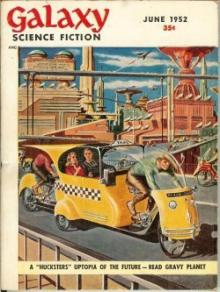 Galaxy
Galaxy Conquest Over Time
Conquest Over Time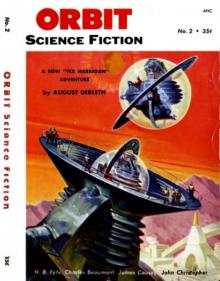 Potential Enemy
Potential Enemy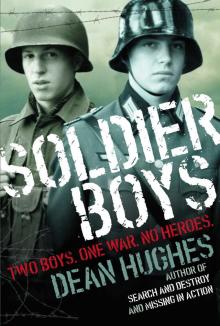 Soldier Boy
Soldier Boy Wainer
Wainer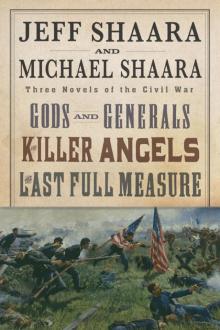 The Civil War Trilogy: Gods and Generals / the Killer Angels / the Last Full Measure
The Civil War Trilogy: Gods and Generals / the Killer Angels / the Last Full Measure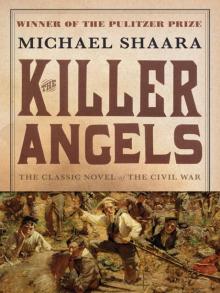 The Killer Angels
The Killer Angels